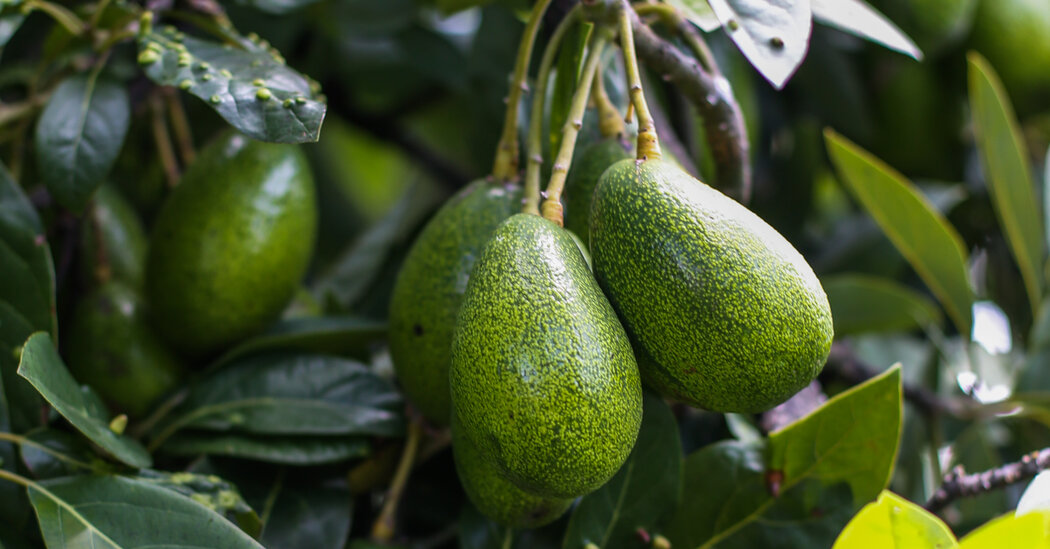
Whether smeared on toast, added to a salad or topping a burrito, the avocado has become a staple in the diets of many Americans.
But the creamy fruit could become more difficult to find. The United States decided late last week to temporarily block all imports of avocados from Mexico after a verbal threat was made to U.S. safety inspectors working in the country.
The suspension will “remain in place for as long as necessary to ensure the appropriate actions are taken, to secure the safety of APHIS personnel working in Mexico,” the U.S. Department of Agriculture said in a statement, referring to the Animal and Plant Health Inspection Service.
In the United States, where 80 percent of the avocados consumed come from Mexico and the average price of $1.43 an avocado was already nearly 11 percent higher than a year ago, analysts said even a two-week ban could sharply reduce availability and further increase prices.
The move is a blow to the western state of Michoacán in Mexico, the only region approved in Mexico to send avocados to the United States. There, the green fruit is a big business, with annual exports totaling nearly $3 billion. The bulk of those avocados go to the United States.
While details of the threat to agency employees were not made public, the avocado industry has attracted interest in the past decade from the drug cartels in the region, which have become more fragmented and sought ways to diversify their illicit income streams.
“I had an interview with a cartel leader 10 years ago who was bragging about how much money he was making from avocados,” said Falko Ernst, a Mexico analyst with the nonprofit International Crisis Group. “You’ve got a concentration of economic wealth in the region, and the possibility to siphon part of that off has acted as a magnet for these groups.”
Mexican gangs are also being blamed for limiting lime production and shipments in order to drive up prices.
In a statement, the Association of Avocado Exporting Producers and Packers of Mexico, which represents 29,000 avocado farmers and 65 packing houses, said its board of directors had met to review security plans and protocols in order to continue to collaborate with Mexican and U.S. authorities and to resume exporting as soon as possible.
The U.S. ban came during one of the avocado’s biggest events, the Super Bowl. And depending on how long it lasts, it could affect one of the industry’s other big days, Cinco de Mayo.
In 1997, the U.S. began lifting a longstanding ban against Mexican avocados after weevils, scabs and other pests entered U.S. orchards from imported products.
Now, U.S. inspectors in Mexico play a crucial role in the expansion of Mexico’s avocado market because they watch each step of the process — from the orchards to transportation systems to shipping areas — to make sure that the fruit imported to the United States is free from pests, said David Orden, a professor in the department of agricultural and applied economics at Virginia Tech.
“This was a nice story about how a group of agribusinessmen and farmers used scientific methods to reduce pest risk and allow trade to occur where there wouldn’t normally be an opportunity,” Mr. Orden said. “It was a nice story until the drug cartels got involved.”
California, which supplies roughly 15 percent of the U.S. avocado market, simply cannot produce enough to meet demand from consumers nibbling on chips and guacamole and putting avocados in smoothies. The per capita annual consumption of avocados has grown to nine pounds, from four pounds in 2010, and could exceed 11 pounds in the next five years, according to analysts at RaboResearch.
The avocado industry has long benefited from clever marketing campaigns. In the 1980s, ads by the California Avocado Commission showed the actress Angie Dickinson in a white leotard, her legs stretching on forever, eating and extolling the diet and health benefits of the avocado. “Would this body lie to you?” she cooed.
But the big marketing push has come during the Super Bowl. Avocados From Mexico began airing quirky commercials in the past decade, one featuring the comedian Jon Lovitz’s floating head and another with the 1980s actress Molly Ringwald as an infomercial host hawking pricey gear for your avocado, like a personal carrier or a yurt.
On Sunday, Avocados From Mexico aired its latest ad during the game. It featured ancient Roman tailgaters at the Colosseum noshing on guacamole and dancing. Reviews online were mixed.
Avocado farmers in the Michoacán region said even a ban that lasted a couple of months could have a huge negative impact on the local economy.
“The growing season basically ends in May, and if we lose a couple of months to sell, we’ll end up with too much fruit to sell in two month’s time,” said Jose Humberto Solorzano Mendoza, a third-generation avocado grower who has created a digital platform for producers to share pricing information to improve transparency. “The produce will be worthless, and it will fall off the trees after May.”
And a collapse in prices, he said, could lead to increased immigration from the area into the United States. “There are people who are living here because of the avocado,” he said. “They make their living from that. If we don’t have the avocado, they’ll move on.”
Mr. Ernst of the International Crisis Group said that if the “warning shot” of a temporary ban turned into something more long term, it would affect the economy and make it easier for the criminal enterprises to attract recruits.
“You have tens of thousands of hardworking, law-abiding families that depend on this industry,” Mr. Ernst said. “If you take away their livelihoods, you play into the hands of the criminal groups.”




